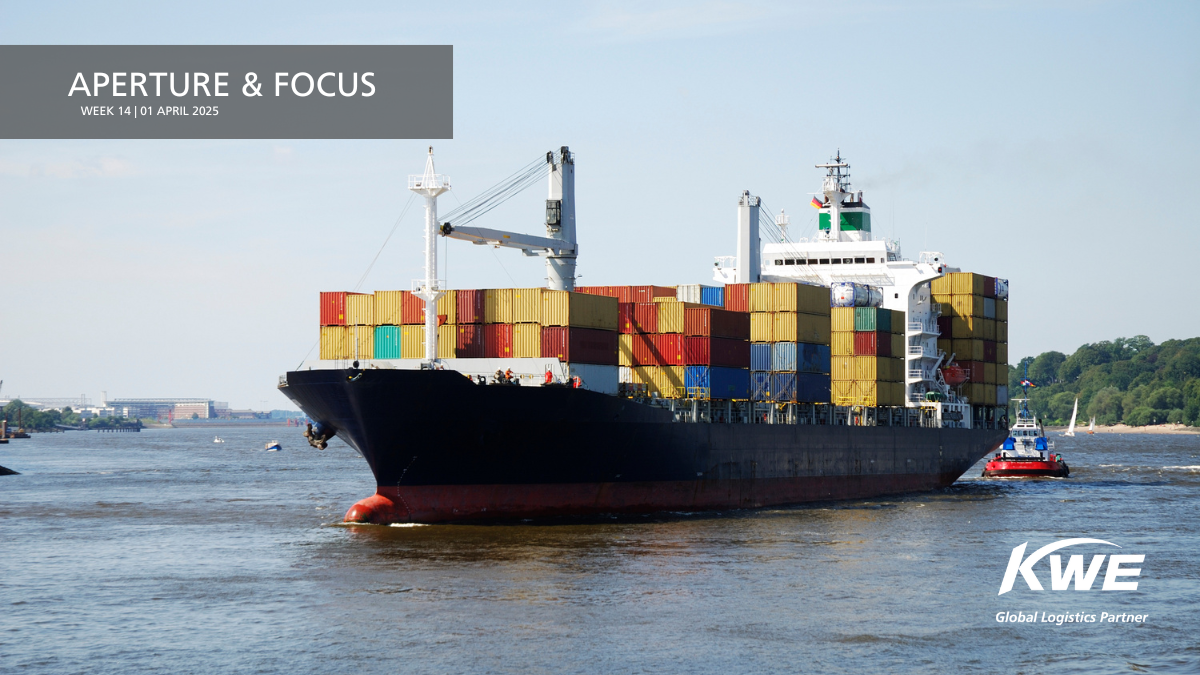Quote
Aperture & Focus 2025: Week 14

Global Aperture
The shipping industry is focusing on how to meet emissions regulations, with emphasis on support roles to help companies comply with environmental goals. As regulatory demands increase, companies are looking for effective solutions and partnerships to manage their environmental impact and ensure sustainability in operations.
In March 2025, the maritime industry continued its shift towards alternative fuels, with methanol leading the way, securing 12 orders across various vessel segments, including cruise ships, car carriers, bulk carriers, and tankers. LNG remained strong in the container shipping sector with seven new orders, while ammonia saw its first traction with two orders for oil/chemical tankers.
Regional Focus
Americas
United States: In recent weeks, shippers have been scrambling to secure capacity ahead of the tariff increases the Trump administration have stated will go in effect on April 2nd, particularly on products from Canada, Mexico, and other countries facing reciprocal tariffs. Charter demand has surged across industries, including automotive, pharmaceuticals, and electronics, with a 10% increase in Asia-US capacity over the past 48 hours, alongside double-digit surges in freighter operations from Europe, Asia, and South America to the US.
The U.S. plans to impose multi-million dollar port fees on Chinese-built vessels, prompting shipowners and charterers to adjust leasing contracts to manage potential costs. These fees, which could reach up to $3.5 million per port visit, are raising concerns over global supply chain disruptions and the impact on industries, particularly those dealing with low-value goods.
Asia-Pacific
The March 28th, 2025, earthquake in Myanmar has caused extensive damage to key infrastructure, including roads, bridges, and airports, impeding the movement of goods, and causing delays to freight operations. While air cargo hubs in the region, such as Bangkok’s Suvarnabhumi Airport, reported flight delays, the broader impact on global supply chains is still being assessed. For more information, refer to KWE’s latest Customer Advisory.
Europe, Middle East & Africa
Europe: On April 1st, the EU’s ICS2 system begins its enforcement of stricter customs regulations, requiring all non-EU imports to submit entry summary declarations (ENS) through freight forwarders, importers, and handling agents across all transport modes. However, European freight forwarders have faced challenges with system integration, inadequate support from national authorities, and operational disruptions, including delays and refusal to load cargo due to missing or incorrect documentation.
Belgium: The Joint Trade Union Front Ports of Belgium (GVHB) staged a nationwide port strike from March 30th–April 1st to protest proposed pension reforms. Organized by the General Federation of Belgian Labour – Transport Union (ABVV-BTB), the Liberal Union of Transport Workers (ACLVB), and the Confederation of Christian Trade Unions – Transport and Communication (ACV-Transcom), dockworkers halted operations for one hour per shift at key terminals in Antwerp, Zeebrugge, and Ghent. The strike disrupted maritime traffic, with 34 vessels awaiting entry, while towing services, locks, and pilot operations faced restrictions.
Additionally, all flights departing from Brussels Airport and Brussels South Charleroi Airport were canceled on March 31stdue to a one-day general strike in Belgium protesting labor market reforms. The strike also disrupted local transportation, including trains, buses, trams, and some Eurostar services, affecting both passenger and cargo operations.
France: Dockers in France have suspended a strike action planned for April following more favorable responses from the government regarding the national pension reform. This last-minute decision, made after a series of failed meetings in March, successfully avoids potential disruptions. As a result, port operations, including sea freight services like carriers' schedules, equipment availability, trucking, and customs, will continue as normal